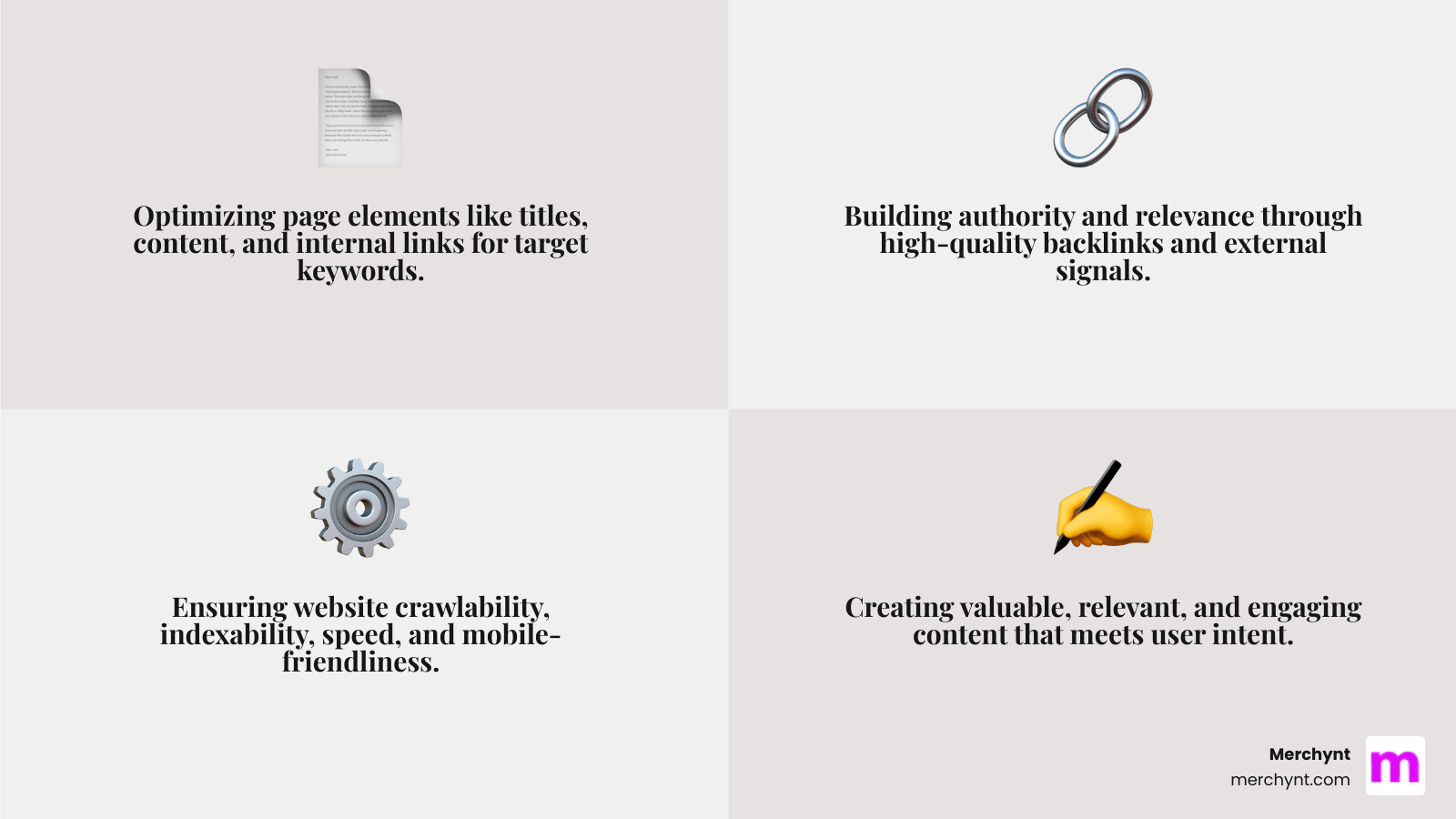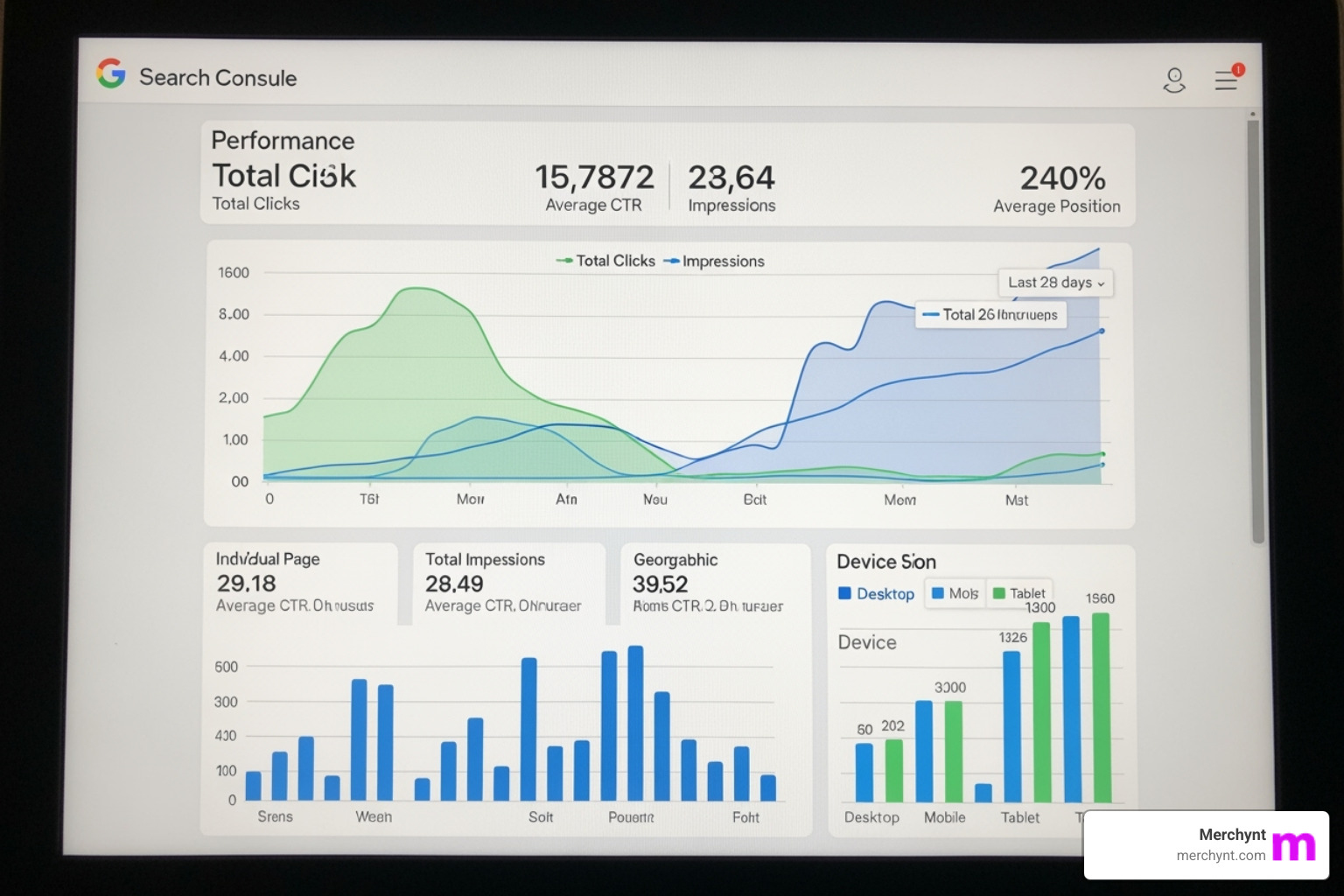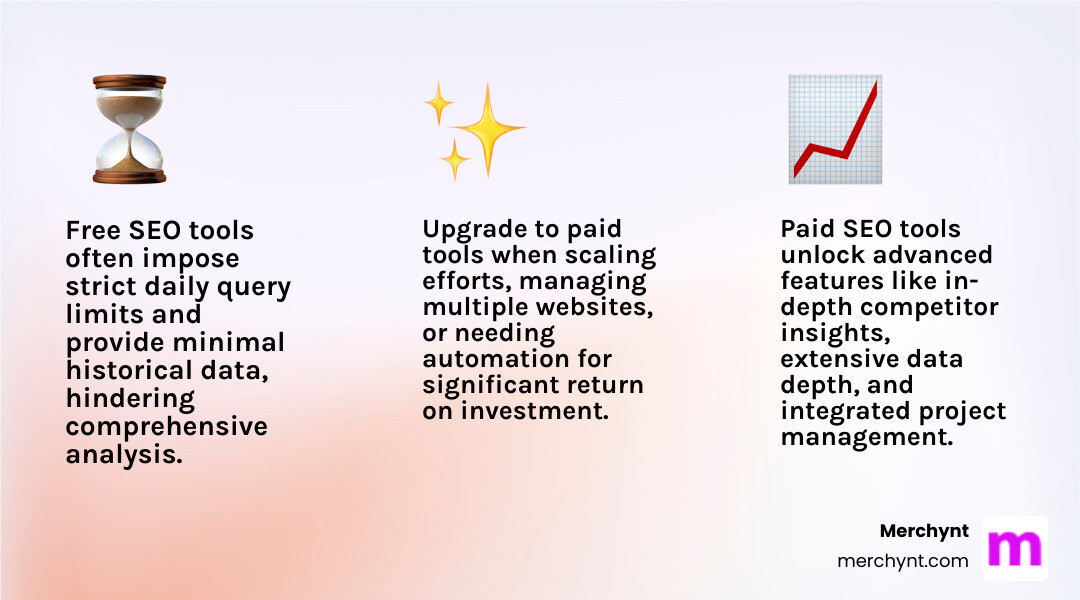
Why SEO Optimization Tools Are Essential for Your Business Success in 2025
SEO optimization tools free options are more powerful than ever in 2025, giving small businesses and agencies access to the same data and insights that were once only available to enterprise companies. Here are the top free SEO tools you need to know about:
Essential Free SEO Tools:
- Google Search Console - Track website performance and fix technical issues
- Google Analytics 4 - Understand user behavior and traffic sources
- Google Keyword Planner - Research keywords and search volumes
- Screaming Frog (free version) - Audit up to 500 URLs for technical problems
- Ahrefs Backlink Checker (free version) - Analyze your link profile
- Yoast SEO (free version) - Optimize WordPress content
- ChatGPT/Claude (free versions) - Create and optimize content with AI
Getting found online isn't optional anymore - it's survival. With 97% of consumers searching for local businesses online, having the right SEO tools can mean the difference between thriving and barely surviving in today's digital landscape.
The good news? You don't need a massive budget to compete. Many of the most effective SEO tools offer robust free versions that can help you track your website's performance, find new keyword opportunities, fix technical issues, and understand what your competitors are doing.
Whether you're a small business owner trying to rank higher on Google Maps or an agency looking to deliver better results for clients, the right mix of free tools can give you insights that would have cost thousands of dollars just a few years ago.
I'm Justin Silverman, and I've helped over 10,000 businesses optimize their online presence through my company Merchynt, where we've developed AI-powered tools including Paige, our automated local SEO platform. My experience building seo optimization tools free solutions has shown me exactly which tools deliver real results without breaking the bank.

The Foundation: Must-Have Free Tools from Google & Bing
Think of these foundational tools as your SEO command center. Before you explore any fancy third-party options, you need to master the seo optimization tools free offerings from Google and Bing themselves. These aren't just "free trials" with hidden catches - they're genuinely powerful platforms that give you direct access to first-party data straight from the search engines.
What makes these tools so special? They offer the most accurate picture of how search engines actually see your website. No guesswork, no estimates - just pure data on your website performance, indexing issues, user behavior, and overall SEO health.

Google Search Console (GSC)
Google Search Console is like having a direct phone line to Google - except instead of being put on hold for hours, you get instant insights into exactly how Google sees your website. This completely free tool is your window into Google's mind.
The performance reports are where the magic happens. You'll see real data on clicks, impressions, CTR, and average position for every keyword that brings people to your site. Want to know which blog post is your secret traffic goldmine? GSC will tell you. Curious about which keywords you're almost ranking well for? It's all there.
But GSC isn't just about celebrating your wins - it's your early warning system for fixing website issues. When Google can't crawl a page, finds duplicate content, or spots mobile usability problems, GSC sends up the red flags. You can also use it for submitting sitemaps to make sure Google knows about all your important pages.
I've seen businesses double their organic traffic just by fixing the issues GSC flagged. It's that powerful.
Learn more about the GSC platform
Google Analytics 4 (GA4)
If Google Search Console tells you how people find your website, Google Analytics 4 shows you what happens next. This free analytics powerhouse dives deep into user behavior, traffic sources, conversion tracking, and audience analysis.
GA4 answers the questions that keep business owners up at night: Are people actually reading my content? Which pages make visitors leave immediately? What's driving my best customers to convert? The platform tracks everything from where visitors come from (organic search, social media, email) to how long they stay and what actions they take.
The conversion tracking feature is particularly valuable. You can set up goals to measure when visitors complete important actions like making purchases, filling out contact forms, or downloading resources. This helps you understand which SEO efforts actually drive business results, not just vanity metrics.
A comprehensive guide to using AI for SEO
Bing Webmaster Tools
Here's where most people make a mistake - they ignore Bing completely. Google dominates search, but Bing still powers about 20% of searches in the US. That's millions of potential customers you're missing if you don't optimize for Bing too.
Bing Webmaster Tools is essentially Bing's equivalent to Google Search Console, offering free technical audits, keyword research tools, and backlink data. The interface is clean and user-friendly, and it often catches issues that Google Search Console might miss.
One feature I particularly love is the site scanning tool, which automatically crawls your website and identifies common SEO problems. It's like having a technical SEO expert review your site for free. Plus, Bing's keyword research tools sometimes reveal search opportunities that Google's tools don't show.
The setup takes just a few minutes, and the insights you'll gain make it one of the most underused seo optimization tools free available today.
Top-Tier seo optimization tools free for Every Task
Now that we've covered the essentials from Google and Bing, it's time to build out your complete seo optimization tools free arsenal. Think of this as assembling your SEO dream team - each tool has its specialty, and together they'll help you tackle every challenge from finding golden keywords to fixing those pesky technical issues that keep your site from ranking.
The beauty of today's free tool landscape is that you can genuinely compete with businesses spending thousands on premium software. You just need to know which tool does what best.
Best seo optimization tools free for keyword research and analysis
Keyword research is like detective work - we're trying to figure out exactly what our potential customers are typing into Google when they need what we offer. The good news? Some of the best investigative tools won't cost you a penny.
Google Keyword Planner remains the gold standard for keyword research, and it's completely free. Originally built for advertisers, it's become the go-to for SEO professionals who want real search volume data straight from Google. You can find new keywords, see how often they're searched, and even get forecasts on performance. It's particularly valuable because the data comes directly from the source.
When you want to spot trends before they explode, Google Trends is your crystal ball. This free tool shows you whether a keyword is gaining steam or cooling down, and you can even compare different terms to see which one's worth your time. I've seen businesses jump on trending topics early and ride the wave to massive traffic gains.
AnswerThePublic takes a different approach - it shows you the actual questions people are asking about your keywords. The free version gives you three searches per day, which is plenty to generate dozens of content ideas. It's like having a direct line to your audience's curiosity.
AlsoAsked works similarly, pulling those "People Also Ask" questions you see in Google search results. This is pure gold for understanding user intent and creating content that actually answers what people want to know.
The Keywords Everywhere Chrome extension (free version) puts keyword data right in your search results, so you can spot opportunities as you browse. It's like having SEO superpowers built into your browser.
Find the right SEO Keywords Ranking Tool
Essential seo optimization tools free for on-page and technical audits
Technical SEO might sound intimidating, but these free tools make it manageable. Think of them as your website's health check-up - they'll spot problems before they become ranking disasters.

Screaming Frog SEO Spider is the Swiss Army knife of technical SEO. The free version crawls up to 500 URLs and finds everything from broken links to missing title tags. I once helped a client whose homepage mysteriously disappeared from Google - Screaming Frog found a rogue 'noindex' tag that was hiding their entire site. Crisis averted!
Seobility offers a comprehensive free website analysis that checks everything from meta tags to server configuration. With five free checks per day, it's perfect for getting an overall health score and spotting critical issues that need immediate attention.
SEOptimer provides a whole toolkit of free generators - meta tags, robots.txt files, XML sitemaps, and more. It's like having a technical SEO assistant that helps you create all the behind-the-scenes elements that search engines love.
The Detailed Chrome Extension gives you instant SEO insights for any webpage with just one click. No more switching between multiple tools - all the essential on-page data is right there in your browser.
If you're using WordPress, Yoast SEO (free version) is practically mandatory. It guides you through optimizing every piece of content with real-time feedback, making on-page SEO feel less like rocket science and more like following a helpful recipe.
Free tools for backlink analysis and competitor research
Understanding your competition isn't about copying what they do - it's about finding opportunities they've missed and learning from their successes. These free tools give you insider intelligence on what's working in your industry.
Ahrefs Backlink Checker (free version) lets you peek behind the curtain at any website's link profile. You'll see their top 100 backlinks and get a Domain Rating score, which is incredibly useful for competitor analysis or vetting potential link partners. It's like getting a taste of premium data without the premium price.
Semrush offers a limited free plan that's surprisingly generous. You can see a competitor's top organic keywords, estimated traffic, and some backlink data. It's perfect for understanding what's driving your competitors' success and spotting keyword opportunities they might have missed.
SimilarWeb (free plan) shows you the bigger picture - where your competitors' traffic comes from, their audience demographics, and overall digital presence. This helps you understand market trends and see how you stack up against the competition.
Explore our Free Local SEO Tools
The Rise of AI: Leveraging Free AI-Powered SEO Tools
The world of SEO is experiencing a revolution, and AI is leading the charge. What used to take hours of manual work can now be accomplished in minutes with the right AI tools. We're not just talking about traditional search engine optimization anymore - we're entering the era of Answer Engine Optimization (AEO), where AI chatbots and AI overviews are becoming major players in how people find information online.
This shift means our seo optimization tools free arsenal needs to include AI-powered solutions that can help us create better content faster, automate repetitive workflows, and adapt to how search engines are evolving. The best part? Many of these game-changing AI tools offer robust free versions that can transform how we approach SEO.

AI for Content Creation and Optimization
Think of AI as your tireless writing assistant who never gets coffee breaks. These tools excel at content brainstorming, content scoring, readability analysis, and proofreading - helping us create content that both search engines and humans love.
ChatGPT (free version) has become the go-to tool for content creators everywhere, and for good reason. Whether we're stuck staring at a blank page or need help refining our writing style, ChatGPT can jump in as our brainstorming partner. It's particularly brilliant at generating content outlines, helping us structure complex topics, and even troubleshooting tricky SEO strategies. Need to explain a complicated concept in simpler terms? ChatGPT has our back.
Claude (free version) brings something special to the table - it's exceptionally good at maintaining context during longer conversations and preserving our unique writing voice. While ChatGPT might be the household name, many content creators prefer Claude for proofreading and ensuring their content maintains coherence from start to finish. It's like having an editor who really "gets" your brand's tone and helps polish your work without losing what makes it uniquely yours.
Both tools are changing how we approach content optimization, making it easier to create material that ranks well while still sounding authentically human.
Specialized AI for Automated Local SEO: Paige by Merchynt
Here's where things get really exciting for local businesses. While general AI tools are fantastic, Paige by Merchynt is purpose-built for one thing: dominating local search results through automated SEO and Google Business Profile management.
What makes Paige different from other seo optimization tools free options? It's not just another tool you have to learn and manage - it's a fully automated system that handles your local SEO while you focus on running your business. Paige takes care of everything from optimizing your Google Business Profile with the right keywords to managing reviews, scheduling posts, and generating fresh content for your profile.
The results speak for themselves. We've watched hundreds of businesses see dramatic improvements in their Google Maps ranking within weeks of using Paige. Some have even hit the #1 spot across their entire city in just days. It's the kind of success that used to require expensive agencies or countless hours of manual work.
What really sets Paige apart is how it combines cutting-edge AI with deep local SEO expertise. This isn't just AI-powered optimization - it's intelligent automation that actually understands what local customers are looking for and how to help them find your business.
Learn about Google Business Profile Management Software
More on AI SEO Tools
Free vs. Paid SEO Tools: Understanding the Limitations
Let's be honest – seo optimization tools free options are amazing, but they're not magic. Understanding their limitations helps us make smarter decisions about when to stick with free tools and when it might be time to open our wallets.
The reality is that free tools come with trade-offs. Most have daily query limits that can feel pretty restrictive. Take Seobility, which gives us 5 queries per day, or AnswerThePublic with just 3 searches daily. If you're managing multiple websites or doing extensive research, you'll hit these limits fast. Paid tools typically offer unlimited or much higher query allowances, letting us dive deep without constantly watching the clock.
Feature restrictions are another reality check. Free versions usually give us a taste of what's possible – maybe the top 100 backlinks instead of the full profile, or basic keyword metrics without advanced competitor analysis. It's like getting a free sample at the grocery store – enough to know if you like it, but not enough for a full meal.
The data depth difference is often dramatic. While free tools show us current snapshots, paid platforms like Ahrefs and Semrush maintain massive databases with years of historical data. Semrush alone tracks over 25 billion keywords! This historical perspective is invaluable for understanding long-term trends and making strategic decisions.

| Feature | Free SEO Tools | Paid SEO Tools |
|---|---|---|
| Daily Query Limits | Very limited (e.g., 3-5 searches/day, 500 URLs) | High or unlimited queries, suitable for extensive research |
| Historical Data Access | Minimal or none | Extensive historical data (years of trends) |
| Project Management | Basic or none | Integrated, collaborative project workflows |
| Customer Support | Community forums or limited email support | Dedicated support, live chat |
| Data Depth | Basic metrics, summary overviews | Comprehensive data, advanced filters, detailed breakdowns |
| Automation | Manual tasks, simple generators | Automated audits, reporting, content generation, link outreach |
Project management and automation capabilities really separate the free from the paid. Free tools typically require manual work for each task, while paid platforms can automate reports, audits, and even content creation. Our own Paige takes this to the next level by fully automating Google Business Profile management – something you simply can't get with free tools.
Customer support is another consideration. Free tools usually offer community forums or basic email support, while paid subscriptions come with dedicated support teams and live chat. When you're stuck at 2 AM trying to fix a ranking issue, having real human help available makes all the difference.
So when should you consider upgrading? If you're constantly hitting query limits, managing multiple websites, needing deeper competitor insights, or wanting to automate repetitive tasks, it's probably time to invest. Yes, paid tools cost money – Surfer starts at $99/month, Ahrefs at $108/month, Semrush at $139.95/month – but they often pay for themselves through time savings and better results.
The return on investment can be substantial. As one expert put it, "I outrank some of the biggest marketing companies like HubSpot, Zapier, and even Semrush... SEO is 100% worth it." When you consider that better rankings mean more traffic, leads, and revenue, the monthly cost often becomes a no-brainer.
The key is being honest about your needs and growth stage. Free tools are perfect for getting started, learning the ropes, and proving SEO value. But as your business grows and SEO becomes more critical to your success, upgrading to paid tools – or specialized solutions like Paige for local SEO – can be the difference between staying stuck and scaling up.
Frequently Asked Questions about SEO Optimization Tools
Which free SEO tools are best for beginners?
Starting your SEO journey can feel overwhelming with so many tools available, but I always tell beginners to focus on mastering the essentials first. Think of it like learning to cook - you don't need every fancy gadget in the kitchen to make a great meal.
Google Search Console should be your first stop. It's like having a direct conversation with Google about your website. The interface is straightforward, and it shows you exactly how Google sees your site, what errors need fixing, and which keywords are bringing you traffic. Best of all, it's completely free and comes straight from the source.
Next up is Google Analytics 4. While Search Console tells you if people can find you, GA4 shows you what happens when they actually visit your site. Are they staying? Are they leaving immediately? Which pages are they most interested in? This data helps you understand your audience and improve their experience.
For WordPress users, Yoast SEO is a game-changer. This plugin acts like a friendly coach, giving you real-time suggestions as you write. It'll tell you if your title is too long, if you need more keywords, or if your content is hard to read. The traffic light system (red, yellow, green) makes optimization feel like a simple checklist.
Finally, dip your toes into keyword research with Google Keyword Planner and Google Trends. These tools help you understand what people are actually searching for and whether those topics are becoming more or less popular over time.
The beauty of these foundational seo optimization tools free options is that they're designed for regular business owners, not just SEO experts. Master these four, and you'll have a solid understanding of how SEO works before diving into more complex tools.
Can free SEO tools really improve my website's ranking?
This is probably the question I get asked most often, and my answer is always an enthusiastic yes! I've seen countless small businesses achieve remarkable results using primarily free tools. The key is understanding that ranking higher isn't about having the most expensive tools - it's about consistently fixing problems and creating valuable content.
Free tools excel at identifying the low-hanging fruit that can make an immediate impact. Google Search Console might reveal that half your pages aren't being indexed because of a simple robots.txt error. Fix that one issue, and suddenly Google can see and rank pages that were invisible before.
Keyword research with free tools opens up content opportunities you might never have considered. I once helped a local bakery find that people in their area were searching for "gluten-free birthday cakes" far more than generic "birthday cakes." By creating content around that specific keyword using insights from Google Keyword Planner, they started ranking #1 for that term and saw a 40% increase in custom cake orders.
Technical issues caught early prevent bigger problems later. The free version of Screaming Frog can crawl 500 URLs and identify broken links, missing meta descriptions, or duplicate content. These might seem like small issues, but they add up. Search engines reward well-maintained websites with better rankings.
Tracking your progress keeps you motivated and focused. When you can see your organic traffic growing month over month in Google Analytics, or watch your average position improve in Search Console, you know your efforts are paying off.
The limitation isn't whether free tools work - it's usually about scale and time. Free tools require more manual work and have query limits, but for small to medium-sized websites, they provide more than enough functionality to achieve significant ranking improvements.
How do I use free tools to fix website issues?
Let me walk you through a practical approach that I've refined over years of helping businesses fix their SEO problems. Think of this as your monthly website health checkup routine.
Start with Google Search Console for indexing problems. Log into GSC and head straight to the Coverage report. This shows you which pages Google can and can't see. If you spot pages marked as "Error" or "Excluded," don't panic - these are fixable issues. Click on each error type to see which specific pages are affected and why. Common culprits include accidentally adding "noindex" tags or having broken internal links pointing to important pages.
Once you've identified the problems, fix them on your website, then use the URL Inspection tool to ask Google to re-crawl those pages. It's like sending Google a friendly note saying, "Hey, I fixed that problem - please take another look!"
Use Screaming Frog for broken links and technical issues. Download the free version and run a crawl of your website. Focus on the Response Codes tab first - any 404 errors mean you have broken links that need attention. Either fix the links pointing to these pages, recreate the missing content, or set up redirects to send visitors somewhere useful instead.
Check your on-page optimization with browser extensions and auditing tools. Install the Detailed Chrome extension and click through your most important pages. Look for missing or poorly written title tags, meta descriptions that are too long or short, and heading structures that don't make sense. These quick fixes can have an immediate impact on your click-through rates from search results.
For WordPress users, let Yoast SEO be your guide. As you edit each page or post, pay attention to Yoast's feedback. If it's showing red or yellow lights, work through the suggestions until you see green. This might mean adding more internal links, improving your meta description, or breaking up long paragraphs for better readability.
Run periodic site audits with Seobility or SEOptimer. Use your free daily queries to check your most important pages. These tools will flag issues you might miss, like images without alt text, slow loading times, or mobile usability problems.
The secret is consistency rather than perfection. Set aside an hour each month to work through these checks, prioritizing the issues that affect your most important pages first. Small, regular improvements compound over time and lead to better rankings and more traffic.
Conclusion: Build Your Free SEO Toolkit Today
The digital landscape of 2025 has opened doors we never thought possible for small businesses and agencies. What once required expensive enterprise-level tools and massive budgets is now available for free. Throughout this guide, we've explored an incredible array of seo optimization tools free options that can genuinely transform your online presence.
Think about it - just a few years ago, getting detailed insights into your website's performance, understanding what your competitors were doing, or optimizing your content would have cost thousands of dollars monthly. Now, with tools like Google Search Console showing us exactly how Google sees our site, Screaming Frog helping us identify technical issues, and AI assistants like ChatGPT helping us create better content, we have everything we need to compete with the big players.
The key insight I want you to take away is this: SEO is a marathon, not a sprint. Don't feel overwhelmed by all these tools. Start with the foundational ones - Google Search Console and Google Analytics 4 - and gradually add others as you become more comfortable. Each tool you master gives you another competitive advantage.
Focus on providing value to your audience above everything else. The most sophisticated SEO tools in the world won't help if your content doesn't genuinely serve your customers' needs. Search engines are getting smarter every day, and in 2025, the sites that win are the ones that truly care about their users' experience.
For local businesses especially, tools like our Paige AI can automate the complex work of Google Business Profile management, freeing you up to focus on what you do best - running your business. The combination of these free tools with specialized automation can create a powerful engine for local visibility.
Your SEO toolkit doesn't need to be expensive to be effective. By strategically combining these free resources, you can open up immense potential, improve your website's visibility, and achieve impressive search engine rankings without breaking the bank. The power of SEO is within your reach, and the best part? You can start building your toolkit today.
About Author

